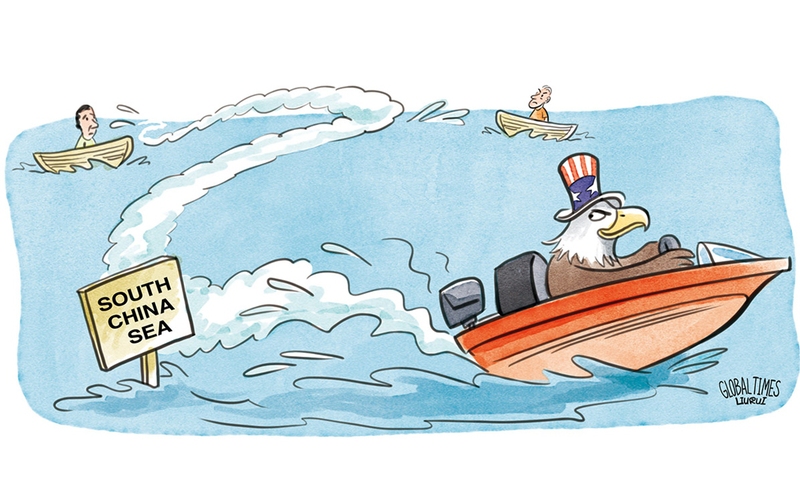以下文章来源于环球时报英文版,2021年1月25日
李开盛,上海社会科学院国际问题研究所副所长、研究员

US prefers instability in the South China Sea. Illustration: Liu Rui/GT
The website of US Indo-Pacific Command reported on Saturday that the Theodore Roosevelt Carrier Strike Group (TRCSG) entered the South China Sea on that day to conduct routine operations. As it took place only three days after the inauguration of US President Joe Biden, the operations have drawn wide attention.
Given that it takes several days to send an aircraft carrier to the South China Sea from the US, the operations can be seen as a continuation of the policies of the Trump administration. It has been noted by certain analysts that even at the end of its tenure, the Trump administration sustained hard-line stances toward China. It made a string of tough narratives and moves in a bid to set a trap for the Biden administration's China policy.
However, Biden did not stop or prevent the TRCSG's operations this time. This indicates that Biden and his team do not oppose policies that pile pressure on China over the South China Sea. They are, moreover, reluctant to send any signal showing US softness toward China.
Hence, the operations of TRCSG this time show policy preferences of the Biden administration. This demonstrates its commitment to the Indo-Pacific region and regional countries by virtue of the moves. The new US government still regards the South China Sea as a pivotal strategic region to contain China.
The previous Trump administration had put more emphasis on the Korean Peninsula nuclear issue, and less on the South China Sea. This contrasted sharply with the Obama administration's pivot to Asia and heavy attention to the South China Sea.
The Biden administration is likely to return to the Obama era in this regard. In this scenario, the significance of the South China Sea in the US Indo-Pacific Strategy will rise. In terms of policies, as Biden's team pushes to rope in allies and partners by invoking the so-called international rules and regulations, they will attach more importance to diplomacy.
It will continue to pile military pressure against US rivals and adopt the so-called freedom of navigation operations as a crucial tactic. While the Biden administration will generally abandon nearly all of Trump's jingoistic foreign policies, it will still cultivate a positive attitude toward the overall Indo-Pacific Strategy. The new US government will thus continue the previous one's South China Sea policies.
Biden said he would unite US allies and partners. The Philippines and Thailand are US allies, and Singapore is its partner. US ties with Vietnam are also getting closer. It can be imagined that the Biden administration will continue to pay close attention to the domestic situations in these countries.
Philippine President Rodrigo Duterte's term in office will end in June 2022. Different forces in the country have already started competing for the upcoming election. The US must be considering how to support pro-US politicians and how to boost pro-US public opinion and forces there.
Washington may also closely follow the upcoming 13th National Congress of the Communist Party of Vietnam (CPV). If there are turns of events favorable to the US, US-Vietnam ties may step onto a new level.
Thailand and Singapore are skilled at keeping a balance between China and the US. Such a policy has withstood years of tests. Room for the US to make them change their previous tactics is quite limited.
In the face of the Biden administration's policy orientation over Asia, most of its Asian allies will strategically support it, but will be careful in terms of policy.
Many Asian countries are still skeptical of China's rise and would like to see US involvement as balancing China's influence. But they also understand that the China-US relationship is the world's most consequential bilateral relationship and matters to both regional and global order. If there is ever a serious conflict between the two countries, any third party will be affected.
These countries will not easily take sides in the China-US rivalry. However, some countries which have sovereign and security disputes with China may take advantage of the US strength and influence to confront China. This could include Japan, which has territorial disputes with China over the Diaoyu Islands, and the Philippines, which contests China's claims in the South China Sea,
Some analysts are watching whether or not Biden will continue Obama's policies to bring the South China Sea issue to an international arbitral tribunal. Playing the legal card costs the US nothing, and it can easily shape China's image as a destroyer of international law and order. This also fits the approach of the Biden administration to compete with China.
But will relevant countries cooperate? The Philippines under the rule of Duterte is unlikely to make a fuss about the waters. Vietnam will focus on the leadership transition around its 13th National Congress of the CPV and is unlikely to raise an arbitration demands in the short term. But from a long-term perspective, instigating regional countries to launch an international arbitration against China is an important option for the Biden administration.